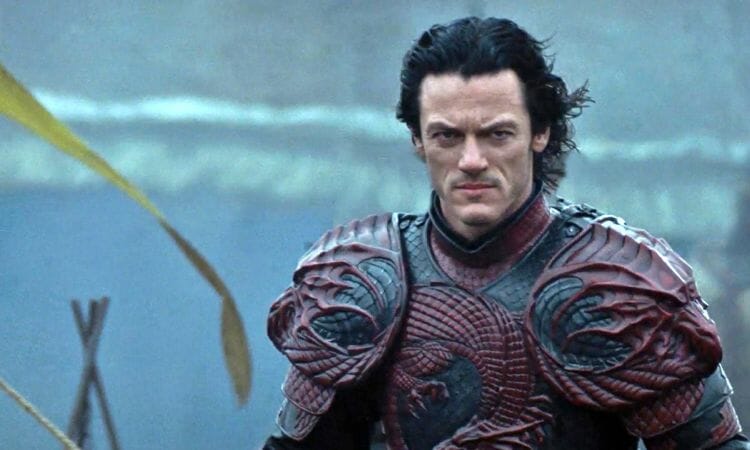Sign up for the
TSL Newsletter
and get $50 off Final Draft 12
By Jim Rohner · October 13, 2014

Only the first 10-15 minutes of Francis Ford Coppola's 1992 Dracula are concerned with explaining how the anecdotal Dracula (Gary Oldman) of history transformed into the mythological Dracula of legend. A warrior fighting for the Hungarian Order of the Dragon against the Turks, Dracula's long absence away from his wife, Elisabeta (Winona Ryder), proliferates a false report that he's been killed and in her grief, Elisabeta throws herself from a cliff. Returning to find his beloved dead and the Church for which he's so committedly fought condemning her soul to eternal hell as a suicide, Dracula renounces God, vowing to return from the grave with all the power of darkness to avenge her sealing the pact with a drink of blood that pours mysteriously from a stone cross he punctures with a sword. Sufficiently explained and effectively staged, Coppola spends no more time on the "how" or "why," trusting that that's enough groundwork to carry his audience through a narrative explaining the eternal consequences.
Coppola's film has little to do with 2014's Dracula Untold aside from some namedropping (namely, Dracula), but stands more than 20 years later as a much more efficient example of origin telling and emotional invoking. Those 10-15 minutes told us all that we needed to know about the back story of Dracula in order to provide context for why he is the way he is while the subsequent narrative fleshed out the conflicts, both internal and external, that such a decision catalyzed. While that was enough for Coppola and producers at Columbia, it apparently wasn't satisfactory for modern day executives at Universal.
The studio that's attempting to reboot its monsters universe has struck first with Dracula Untold, a film based around the unsubstantiated presumption that people cannot and will not sleep at night until they're told a detailed origin story about their favorite vampire. From a financial standpoint, I suppose it makes sense – how could any executive with a desire to emulate the interwoven universe of comic book films (something in which Universal is interested) circumvent the tried and true origin story? But creatively, that presumption is complete bunk, making the same mistake that countless other horror remakes have made in assuming that the legacy of its property, which has been made effective over the decades due to the layering on of mystery and myth, is incomplete unless made approachable.
This is, of course, wrong, but that doesn't stop the filmmakers from giving it the old college try. In the eyes of two screenwriters (Matt Sazama and amazingly-named Burk Sharpless) and a director of whom you've never heard (Gary Shore), Dracula (Luke Evans) is a tragic character, a good man whose hand is forced to do bad things by extenuating circumstances. A Transylvanian prince who earned the nickname "The Impaler" due to reasons I'm sure you can imagine, Vlad is a devoted family man and a benevolent leader who vows to protect his people at all costs. Guess what the cost is when Turkish sultan Mehmed (Dominic Cooper) demands that Transylvania give up 1,000 young boys to fight in his army?
Did you guess that the cost was his immortal soul? If so, then congratulations – you've solved the mystery of Dracula in the first 30 minutes of the film's runtime. With the "why" in place, the film lays out the "how", with the benevolent prince seeking the power he needs to defend his people from a monster, an ancient vampire (an exceptional if brief Charles Dance) who explains the pros and cons and vampirism: super strength and speed, improved healing and the ability to control beasts, but an insatiable bloodlust. Fight off the bloodlust for 3 days and Vlad goes back to a regular man who doesn't view his wife as an appetizer. This ultimatum is, I suppose, intended to provide a source of tension, but seeing as Dracula is, well, Dracula, there is no question of "if," just "when" with the ultimate answer being, "who cares?"
Dracula Untold would like you to believe that Vlad's actions carry weight because his decision to pursue a path of righteousness by evil means is a tragedy, the eternal condemnation of a man who just wanted to do good. The filmmakers attempt to convince us of this through many blubbery scenes between Vlad and his wife (Sarah Gadon) and/or son (Art Parkinson), but forget to include the flip side of the coin that helps provide any weight to the idea of what eternal condemnation implies. Vlad remains, from beginning to end, a good man, seemingly unaffected by his decision aside from the fact that trying not to drink blood is really, really tough. The film's biggest crime is not that it's not bad, but that it doesn't need to exist, answering questions that nobody was asking and answering them in a way that could never fulfill expectations that may have been building since Dracula came on the scene in 1897.